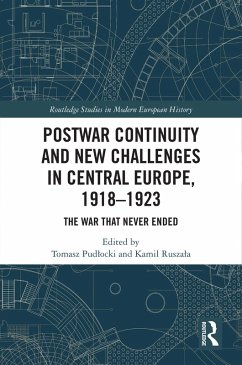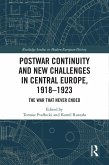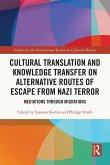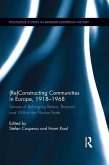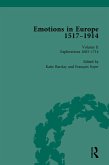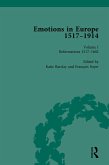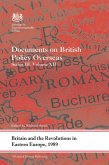Postwar Continuity and New Challenges in Central Europe, 1918-1923 (eBook, ePUB)
The War That Never Ended
Redaktion: Pudlocki, Tomasz; Ruszala, Kamil
42,95 €
42,95 €
inkl. MwSt.
Sofort per Download lieferbar

21 °P sammeln
42,95 €
Als Download kaufen

42,95 €
inkl. MwSt.
Sofort per Download lieferbar

21 °P sammeln
Jetzt verschenken
Alle Infos zum eBook verschenken
42,95 €
inkl. MwSt.
Sofort per Download lieferbar
Alle Infos zum eBook verschenken

21 °P sammeln
Postwar Continuity and New Challenges in Central Europe, 1918-1923 (eBook, ePUB)
The War That Never Ended
Redaktion: Pudlocki, Tomasz; Ruszala, Kamil
- Format: ePub
- Merkliste
- Auf die Merkliste
- Bewerten Bewerten
- Teilen
- Produkt teilen
- Produkterinnerung
- Produkterinnerung

Bitte loggen Sie sich zunächst in Ihr Kundenkonto ein oder registrieren Sie sich bei
bücher.de, um das eBook-Abo tolino select nutzen zu können.
Hier können Sie sich einloggen
Hier können Sie sich einloggen
Sie sind bereits eingeloggt. Klicken Sie auf 2. tolino select Abo, um fortzufahren.

Bitte loggen Sie sich zunächst in Ihr Kundenkonto ein oder registrieren Sie sich bei bücher.de, um das eBook-Abo tolino select nutzen zu können.
This book presents a multi-layered analysis of the situation in Central Europe after the collapse of the Habsburg Empire: organizing the post-imperial space, a new political order, attempts to create new national memories, and solving multiple problems typical of that region after 1918.
- Geräte: eReader
- mit Kopierschutz
- eBook Hilfe
Andere Kunden interessierten sich auch für
![Postwar Continuity and New Challenges in Central Europe, 1918-1923 (eBook, PDF) Postwar Continuity and New Challenges in Central Europe, 1918-1923 (eBook, PDF)]() Postwar Continuity and New Challenges in Central Europe, 1918-1923 (eBook, PDF)42,95 €
Postwar Continuity and New Challenges in Central Europe, 1918-1923 (eBook, PDF)42,95 €![Cultural Translation and Knowledge Transfer on Alternative Routes of Escape from Nazi Terror (eBook, ePUB) Cultural Translation and Knowledge Transfer on Alternative Routes of Escape from Nazi Terror (eBook, ePUB)]() Cultural Translation and Knowledge Transfer on Alternative Routes of Escape from Nazi Terror (eBook, ePUB)42,95 €
Cultural Translation and Knowledge Transfer on Alternative Routes of Escape from Nazi Terror (eBook, ePUB)42,95 €![(Re)Constructing Communities in Europe, 1918-1968 (eBook, ePUB) (Re)Constructing Communities in Europe, 1918-1968 (eBook, ePUB)]() (Re)Constructing Communities in Europe, 1918-1968 (eBook, ePUB)45,95 €
(Re)Constructing Communities in Europe, 1918-1968 (eBook, ePUB)45,95 €![Emotions in Europe, 1517-1914 (eBook, ePUB) Emotions in Europe, 1517-1914 (eBook, ePUB)]() Emotions in Europe, 1517-1914 (eBook, ePUB)54,95 €
Emotions in Europe, 1517-1914 (eBook, ePUB)54,95 €![Emotions in Europe, 1517-1914 (eBook, ePUB) Emotions in Europe, 1517-1914 (eBook, ePUB)]() Emotions in Europe, 1517-1914 (eBook, ePUB)54,95 €
Emotions in Europe, 1517-1914 (eBook, ePUB)54,95 €![Britain and the Revolutions in Eastern Europe, 1989 (eBook, ePUB) Britain and the Revolutions in Eastern Europe, 1989 (eBook, ePUB)]() Britain and the Revolutions in Eastern Europe, 1989 (eBook, ePUB)45,95 €
Britain and the Revolutions in Eastern Europe, 1989 (eBook, ePUB)45,95 €![The Challenges of the US-Japan Military Arrangement: Competing Security Transitions in a Changing International Environment (eBook, ePUB) The Challenges of the US-Japan Military Arrangement: Competing Security Transitions in a Changing International Environment (eBook, ePUB)]() Anthony DifilippoThe Challenges of the US-Japan Military Arrangement: Competing Security Transitions in a Changing International Environment (eBook, ePUB)46,95 €
Anthony DifilippoThe Challenges of the US-Japan Military Arrangement: Competing Security Transitions in a Changing International Environment (eBook, ePUB)46,95 €-
-
-
This book presents a multi-layered analysis of the situation in Central Europe after the collapse of the Habsburg Empire: organizing the post-imperial space, a new political order, attempts to create new national memories, and solving multiple problems typical of that region after 1918.
Dieser Download kann aus rechtlichen Gründen nur mit Rechnungsadresse in A, B, BG, CY, CZ, D, DK, EW, E, FIN, F, GR, HR, H, IRL, I, LT, L, LR, M, NL, PL, P, R, S, SLO, SK ausgeliefert werden.
Produktdetails
- Produktdetails
- Verlag: Taylor & Francis eBooks
- Seitenzahl: 472
- Erscheinungstermin: 30. September 2021
- Englisch
- ISBN-13: 9781000455724
- Artikelnr.: 62441135
- Verlag: Taylor & Francis eBooks
- Seitenzahl: 472
- Erscheinungstermin: 30. September 2021
- Englisch
- ISBN-13: 9781000455724
- Artikelnr.: 62441135
- Herstellerkennzeichnung Die Herstellerinformationen sind derzeit nicht verfügbar.
Tomasz Pud¿ocki is Professor in the Institute of History at Jagiellonian University. Kamil Ruszäa is Assistant Professor at the Institute of History at Jagiellonian University.
1. The War That Never Ended: East-Central Europe After 1918 Part 1: New
Challenges - New Orders 2. The Politics of Recognition at the Paris Peace
Conference 3. The Protection of Minorities at the Paris Peace Conference
(1919-1920) 4. Montenegro 1918-1921 in the Context of the Adriatic Question
5. Diplomacy and National Identity of Czechoslovakia in the Interwar
Period: Appropriation, Thematisation, Institutionalization and
Sustainability Part 2: Postimperial Legacies, Legitimism and Memory 6. The
Leftover Empire?: Imperial Legacies and Statehood in the Successor States
of Austria-Hungary 7. Where Did the Postwar Politics of Memory Lead To? 8.
"Hoch den Kaiser!": The Legitimist Cause in Early Postwar Austria Part 3:
Long Lasting Violence 9. Polish and Ukrainian Propaganda of Violence During
and Shortly After the War for Eastern Galicia (1918-1919) 10. Ethnicization
of Anti-Bolshevism: A Comparative Analysis of Anti-Semitic Violence in
Hungary and Ukraine (1919-1921) 11. "Robbery and Murder": Conflicts at the
Polish-Romanian Border in the Aftermath of the War Part 4: Shaping
Postimperial Space: Administration and Society 12. Three Nations at the
Crossroads: Poles, Jews and Lemkos Between 1918 and 1919 13. The Formation
of a New Administrative and Political Apparatus in Slovakia, 1918-1920:
Backgrounds and Networks 14. Feldsberg/Valtice and the Lower Austrian Towns
That Became Czech, 1918-1920 15. Defending Christianity and Social Order in
the Aftermath of the First World War: Discourse and Polemics in the
Austrian Catholic Conservative Press 16. The Denationalized Children of
Transylvania: The State Children's Asylum in Cluj After 1918 Part 5: In the
Service of Nation and/or State 17. The Birth of Czechoslovakia Between
Ideals and Realpolitik: Masaryk, Bene and tefánik in Balance Between
Italy and France on the International Chessboard 18. The Ukrainian Greek
Catholic Church in 1918-1923: Facing Social and Religious Challenges 19.
The Greek Catholic Parish Clergy in Liberation Struggle of the Galician
Ukrainians in 1918-1923 20. Serving Science versus Serving the Country:
University Professors of Western Neophilologies in Poland, 1918-1923 21.
Stefan Surzycki's Activities for Polish Agriculture in the Revived Polish
State
Challenges - New Orders 2. The Politics of Recognition at the Paris Peace
Conference 3. The Protection of Minorities at the Paris Peace Conference
(1919-1920) 4. Montenegro 1918-1921 in the Context of the Adriatic Question
5. Diplomacy and National Identity of Czechoslovakia in the Interwar
Period: Appropriation, Thematisation, Institutionalization and
Sustainability Part 2: Postimperial Legacies, Legitimism and Memory 6. The
Leftover Empire?: Imperial Legacies and Statehood in the Successor States
of Austria-Hungary 7. Where Did the Postwar Politics of Memory Lead To? 8.
"Hoch den Kaiser!": The Legitimist Cause in Early Postwar Austria Part 3:
Long Lasting Violence 9. Polish and Ukrainian Propaganda of Violence During
and Shortly After the War for Eastern Galicia (1918-1919) 10. Ethnicization
of Anti-Bolshevism: A Comparative Analysis of Anti-Semitic Violence in
Hungary and Ukraine (1919-1921) 11. "Robbery and Murder": Conflicts at the
Polish-Romanian Border in the Aftermath of the War Part 4: Shaping
Postimperial Space: Administration and Society 12. Three Nations at the
Crossroads: Poles, Jews and Lemkos Between 1918 and 1919 13. The Formation
of a New Administrative and Political Apparatus in Slovakia, 1918-1920:
Backgrounds and Networks 14. Feldsberg/Valtice and the Lower Austrian Towns
That Became Czech, 1918-1920 15. Defending Christianity and Social Order in
the Aftermath of the First World War: Discourse and Polemics in the
Austrian Catholic Conservative Press 16. The Denationalized Children of
Transylvania: The State Children's Asylum in Cluj After 1918 Part 5: In the
Service of Nation and/or State 17. The Birth of Czechoslovakia Between
Ideals and Realpolitik: Masaryk, Bene and tefánik in Balance Between
Italy and France on the International Chessboard 18. The Ukrainian Greek
Catholic Church in 1918-1923: Facing Social and Religious Challenges 19.
The Greek Catholic Parish Clergy in Liberation Struggle of the Galician
Ukrainians in 1918-1923 20. Serving Science versus Serving the Country:
University Professors of Western Neophilologies in Poland, 1918-1923 21.
Stefan Surzycki's Activities for Polish Agriculture in the Revived Polish
State
1. The War That Never Ended: East-Central Europe After 1918 Part 1: New
Challenges - New Orders 2. The Politics of Recognition at the Paris Peace
Conference 3. The Protection of Minorities at the Paris Peace Conference
(1919-1920) 4. Montenegro 1918-1921 in the Context of the Adriatic Question
5. Diplomacy and National Identity of Czechoslovakia in the Interwar
Period: Appropriation, Thematisation, Institutionalization and
Sustainability Part 2: Postimperial Legacies, Legitimism and Memory 6. The
Leftover Empire?: Imperial Legacies and Statehood in the Successor States
of Austria-Hungary 7. Where Did the Postwar Politics of Memory Lead To? 8.
"Hoch den Kaiser!": The Legitimist Cause in Early Postwar Austria Part 3:
Long Lasting Violence 9. Polish and Ukrainian Propaganda of Violence During
and Shortly After the War for Eastern Galicia (1918-1919) 10. Ethnicization
of Anti-Bolshevism: A Comparative Analysis of Anti-Semitic Violence in
Hungary and Ukraine (1919-1921) 11. "Robbery and Murder": Conflicts at the
Polish-Romanian Border in the Aftermath of the War Part 4: Shaping
Postimperial Space: Administration and Society 12. Three Nations at the
Crossroads: Poles, Jews and Lemkos Between 1918 and 1919 13. The Formation
of a New Administrative and Political Apparatus in Slovakia, 1918-1920:
Backgrounds and Networks 14. Feldsberg/Valtice and the Lower Austrian Towns
That Became Czech, 1918-1920 15. Defending Christianity and Social Order in
the Aftermath of the First World War: Discourse and Polemics in the
Austrian Catholic Conservative Press 16. The Denationalized Children of
Transylvania: The State Children's Asylum in Cluj After 1918 Part 5: In the
Service of Nation and/or State 17. The Birth of Czechoslovakia Between
Ideals and Realpolitik: Masaryk, Bene and tefánik in Balance Between
Italy and France on the International Chessboard 18. The Ukrainian Greek
Catholic Church in 1918-1923: Facing Social and Religious Challenges 19.
The Greek Catholic Parish Clergy in Liberation Struggle of the Galician
Ukrainians in 1918-1923 20. Serving Science versus Serving the Country:
University Professors of Western Neophilologies in Poland, 1918-1923 21.
Stefan Surzycki's Activities for Polish Agriculture in the Revived Polish
State
Challenges - New Orders 2. The Politics of Recognition at the Paris Peace
Conference 3. The Protection of Minorities at the Paris Peace Conference
(1919-1920) 4. Montenegro 1918-1921 in the Context of the Adriatic Question
5. Diplomacy and National Identity of Czechoslovakia in the Interwar
Period: Appropriation, Thematisation, Institutionalization and
Sustainability Part 2: Postimperial Legacies, Legitimism and Memory 6. The
Leftover Empire?: Imperial Legacies and Statehood in the Successor States
of Austria-Hungary 7. Where Did the Postwar Politics of Memory Lead To? 8.
"Hoch den Kaiser!": The Legitimist Cause in Early Postwar Austria Part 3:
Long Lasting Violence 9. Polish and Ukrainian Propaganda of Violence During
and Shortly After the War for Eastern Galicia (1918-1919) 10. Ethnicization
of Anti-Bolshevism: A Comparative Analysis of Anti-Semitic Violence in
Hungary and Ukraine (1919-1921) 11. "Robbery and Murder": Conflicts at the
Polish-Romanian Border in the Aftermath of the War Part 4: Shaping
Postimperial Space: Administration and Society 12. Three Nations at the
Crossroads: Poles, Jews and Lemkos Between 1918 and 1919 13. The Formation
of a New Administrative and Political Apparatus in Slovakia, 1918-1920:
Backgrounds and Networks 14. Feldsberg/Valtice and the Lower Austrian Towns
That Became Czech, 1918-1920 15. Defending Christianity and Social Order in
the Aftermath of the First World War: Discourse and Polemics in the
Austrian Catholic Conservative Press 16. The Denationalized Children of
Transylvania: The State Children's Asylum in Cluj After 1918 Part 5: In the
Service of Nation and/or State 17. The Birth of Czechoslovakia Between
Ideals and Realpolitik: Masaryk, Bene and tefánik in Balance Between
Italy and France on the International Chessboard 18. The Ukrainian Greek
Catholic Church in 1918-1923: Facing Social and Religious Challenges 19.
The Greek Catholic Parish Clergy in Liberation Struggle of the Galician
Ukrainians in 1918-1923 20. Serving Science versus Serving the Country:
University Professors of Western Neophilologies in Poland, 1918-1923 21.
Stefan Surzycki's Activities for Polish Agriculture in the Revived Polish
State
